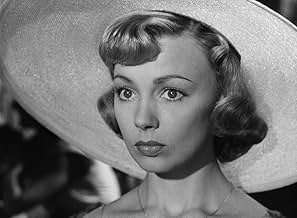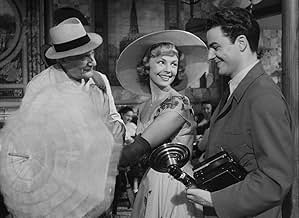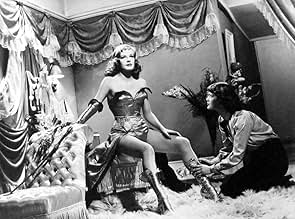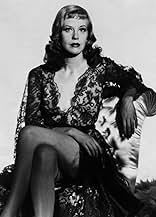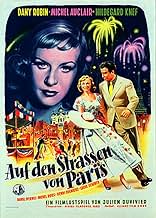Aggiungi una trama nella tua linguaAfter the rejection of their latest--preposterous--scenario, two scriptwriters get back to basics to prepare a new movie. The new scenario centers on Henriette, a pretty, lively Parisian, an... Leggi tuttoAfter the rejection of their latest--preposterous--scenario, two scriptwriters get back to basics to prepare a new movie. The new scenario centers on Henriette, a pretty, lively Parisian, and how she spends the 14th of July in Paris with her fiancé. We follow the tribulations of ... Leggi tuttoAfter the rejection of their latest--preposterous--scenario, two scriptwriters get back to basics to prepare a new movie. The new scenario centers on Henriette, a pretty, lively Parisian, and how she spends the 14th of July in Paris with her fiancé. We follow the tribulations of Henriette as various other characters enter the story and turn a traditional festive day i... Leggi tutto
- Rita Solar
- (as Hildegarde Neff)
- Un scénariste
- (as Louis Seigner de la Comédie Française)
- …
- Un faux déménageur
- (as J.L. Le Goff)
- Dédé
- (as J. Clarieux)
Trama
Lo sapevi?
- QuizFrench censorship visa # 13195.
- Citazioni
Un scénariste: What if we simply told a love story?
Un scénariste: Between two women?
Un scénariste: Between two women?
Un scénariste: What? Between two men?
Un scénariste: Idiot!
Un scénariste: Between who and who then?
- ConnessioniReferenced in Kedamono no iru machi (1958)
The fifties, between the great age of European film in the twenties and early thirties and the renewal of its traditions with the "new wave" movements of the sixties, was in some respects the time when US and European film traditions were at their most compatible. Since the advent of the talkies, compounded by the disaster of the war, US film-style might be said to have been triumphant, less so in Italy (neo-realismo and commedia all'Italiana) but distinctly so in Germany (whose cinema industry had been ruined by Hitler) and France (what the "new wave" would sneeeringly call "the cinéma de papa").
Yet, even at this low tide of European film, the comparison between these two films provides a useful gauge of the huge gulf that still divided European film (at its best) from the programmed mediocrity of Hollywood.
Quine's US film simply does not begin to comprehend the concept behind Duvivier's film. French wit is replaced by a distasteful vulgarity (just as the elegant score by Georges Auric is replaced by the muzack of Nelson Riddle). William Holden was at something of a lowpoint in his career but Audrey Hepburn (who had made Breakfast at Tiffany's in 1961 and Charade in 1963 and would appear in My Fair Lady this same year) would have seemed an ideal casting. Noel Coward does a very camp comic turn and there is an array of stars (Curtis, Dietrich, Sinatra) playing cameos. But nothing can redeem the film.
The French film offers a multi-layered experience where different levels of "reality" are juxtaposed - the entertaining frame-story of the two scenarists, the provisional (and ultimately rejected) ideas for the film to be written (all in practice suggested by one scenarist), shown sharply angled on the screen and what may be the final film (all in practice the work of the other scenarist). From the censorship that has ruled out the original film (that scene with the bishop and the young girl) to the various sensational suggestions made my scenarist A to the final script as devised by scenarist B, there is satirical comedy on every level and some interesting insights into the way a film scenario is constructed. The elements of parody work well (with an excellent recurrent gag about problems of disposing of bodies). There is immense charm in every moment of the film.
What is more, the frame story remains the frame it should be and the film within the film is actually written, which symbolically receives its credits (missing at the beginning) at the end.
The US film is a falsely sentimental story about a middle-aged drunk using the writing of a scenario as a pretext for seducing a young secretary and her not very strenuous attempts to resist. The incidental "satire" (of avant-garde film-making, of "method" acting) is sour and hamfisted and the parody (westerns, horror, war films, musicals, crime) is crude and rudimentary. The film is as entirely charmless as a film with two such charming stars could be.
The frame story (not much of a story) becomes effectively the film (another in the sequence of Hepburn's romances with older men) and the film within the film (a very truncated version of the original filled out with typical sixties kitsch) becomes of little interest.
It is almost exactly as though the US director has watched the French film and deliberately decided to reject everything in it of value.... 1964 was not a good time for US film (but nor was 1952 for French film) but whereas Duvivier was still able to produce a fine intelligent film, Quine's effort merely emphasises how difficult the hidebound US industry was finding it in the sixties to review its practice in the light of new ideas or to compete with the revolution by then occurring in the European film industry.
I più visti
Dettagli
- Tempo di esecuzione1 ora 58 minuti
- Colore
- Mix di suoni
- Proporzioni
- 1.37 : 1
Contribuisci a questa pagina


